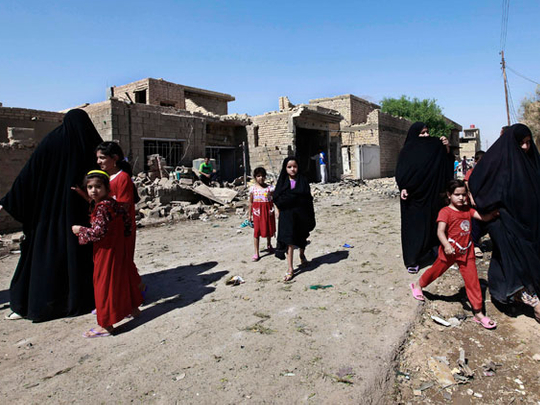
A quota system was introduced in Iraq to distribute power between the different forces in the war-torn country, leaving the Iraqi people as the only victims of this situation.
Since 2003, the allies have been competing to share the booty, bearing in mind that Iraq is rich in resources and not just in oil. Its archaeological treasures and masterpieces dating back thousands of years were looted.
Now, Iraq is ruled by an authority that gets orders from outside, while it practices the same policy of repression and persecution of Iraqi people that was adopted by the former regime.
According to international statistics, thousands of Iraqis fled fearing for their lives, escaping the religious persecution systemically exercised by certain groups. The migration of Iraqi Christians provides concrete evidence of such religious oppression. As a result of this systemic punishment, a lot of Iraqi families — who used to inter marry, especially Sunni and Shiite Muslims — were scattered within and outside Iraq.
Iraq was invaded in 2003 under the pretext of “weapons of mass destruction” — an excuse that was later rebuffed by the US team tasked with the verification of Iraqi weapons.
With regard to these so-called “weapons of mass destruction” in Iraq, the question is which party was involved in providing these weapons and how much was paid for these arms? Or, maybe, those secrets exist in Swiss banks!
However, it has become clear that the main objective of the invasion of Iraq was to reshape the map of the Arab world — whether Iraq or Syria, and maybe other countries — with the aim of elimination of national unity, thereby sowing the seeds of sectarian, ethnic and religious strife, taking control of the oil wells and looting other valuable assets.
Memories are still fresh of scenes involving black cars loaded with historical manuscripts and antiques looted from museums despite attempts by some workers to prevent the looters and preserve the rich and precious human heritage.
The support extended by world powers to some political parties is nothing but a manipulation of people’s emotions with the aim of fuelling internal conflict along the lines of the British policy of “Divide and Rule” that was adopted by the Empire since the 16th century.
Today, the same mouthpieces and media propaganda are implementing similar malicious design against Syria. I am not defending the Syrian regime, which committed many massacres over the past decades since the Syrian Baath party took over. Maybe, the assassination of Lebanese leader Kamal Junblatt was the start of a series of crimes and assassinations of political leaders by the Baathist regime in Syria. Junblatt was a symbol of national unity in Lebanon — a man who devoted his life to the well-being of his people and country. Junblatt was assassinated because he gained nationwide popularity and respect among all groups in Lebanon. This annoyed the Baathist regime and it decided to get rid of him. The situation led to the emergence of sectarian militias which killed on the basis of ethnic or sectarian identity.
Will Arabs wait until the release of secret British, French, American or Russian documents, to discover new hidden truths that would explain what is going on in the Arab world? Nowadays, media has resumed talk of the late Egyptian leader, Jamal Abdul Nasser, and late Palestinian leader, Yasser Arafat, and possibly later will talk about the late Iraqi president ,Saddam Hussain, or King Faisal Bin Abdul Aziz, who led Arab people through different stages in the modern history of the Arab world.
We must bear in mind that the policy of persecution, torture and terrorism did not save Saddam from his fate, despite the long trials that seemed like a farce. Arabs must draw lessons from the events that took place in Iraq and earlier in Lebanon as a result of sectarianism and other deadly social diseases. Sectarianism is the axe that will destroy Arab societies, if the Arabs do not wake up and realise the danger now. The foreign powers always try to turn friendly relations between Arab states and their neighbours into political conflicts in order to plunder natural resources and wealth, especially in the Arab Gulf region. Also, there are some countries which have historical dreams to dominate the region, assisted by others.
Arabs need to learn from previous mistakes and learn the lessons well, so as to avoid Iraq’s fate.
Above all, the territorial unity of Iraq and Syria is a red line that must not be crossed by anyone, both inside and outside. Will the Arabs resort to reason and logic when drawing up policies, both for the short and long term? Is there anyone who can light a candle on the road or will the deep darkness take us back to the Middle Ages?
Dr Mohammad Abdullah Al Mutawa is a professor of sociology.












